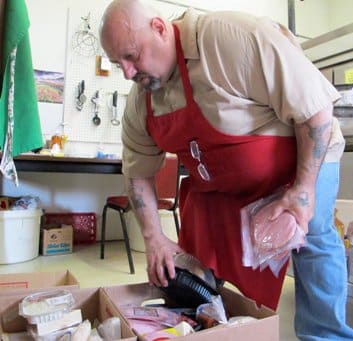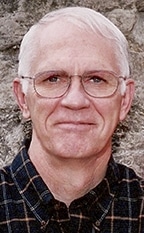ROANOKE RAPIDS, N.C. — The demographics of Halifax County, N.C., are appalling. Unemployment is above 13 percent and one resident in four earns income below the poverty line. The county is part of the fourth poorest congressional district in the nation.

“This place provides spiritual rehabilitation,” said Kenneth Shaw of the Union Mission where he works.
|
But LaCount Anderson, a field coordinator with the Cooperative Baptist Fellowship, doesn’t need the Census Bureau to tell him any of that. “My eyes tell me that, too,” he said. “This place is depressed.”
Anderson has been telling the world about Halifax County since he and his wife, Anna, arrived in the area in 2009 as part of a CBF project to help open a front against poverty in Roanoke Rapids and the surrounding region.
The result is the Eastern North Carolina Poverty Network, an affiliation of churches and non-profit groups pooling their money and ministry resources into a multi-county, multi-denominational effort to serve the working poor.
As a whole they provide shelter for at-risk men and women, job training, substance-abuse counseling, mentoring, clothing, food and other services like rental and utility assistance.
The network also includes the Union Mission, a campus that consists of a thrift store, men’s residential program and a food co-op center for the city. Anderson serves as its executive director.
A similar program, called The Faith House, is run for women in nearby Enfield.
But the network’s continual growth has been often outmatched by demand. Food distribution jumped from 50 boxes a month in 2010 to 700 a month in 2011, and continues to grow.
“Sometimes our donors come to us for assistance,” Anderson said.
And that’s just at the mission in Roanoke Rapids, not at the other food pantries and other facilities across the network.
“We are always on the edge of financial disaster,” he said.
But even a financially troubled poverty network is better than none, said Halifax native and Southern Baptist Vickie Irby.
Irby is the administrator at All Saints Episcopal Church in Roanoke Rapids, where part of her job is to oversee the church food bank and other assistance efforts.
A few churches were already working before Anderson’s arrival, but the evolution of the Eastern North Carolina Poverty Network has made it more efficient and less stressful to help those in need, Irby said.
“It just takes the burden off one church and it helps us when someone is scamming us,” Irby said.
Irby said it’s hard for outsiders to understand how distressed the region is. There was a time when about a dozen paper mills operated in the county. “Now there’s just one,” she said.
The 1979 Oscar-winning film Norma Rae, starring Sally Field, was based on the union-organizing events that happened in Halifax County. But neither the film nor a subsequent effort to create a Branson, Mo.-style entertainment center ever translated into economic gains for the county. Many of those who work continue at or near the poverty level.
“I have three jobs,” Irby said. “If you don’t, you can’t make it.”
One blessing about the network is that it has united churches as disparate as Baptist, Presbyterian, Methodist, Catholic and Episcopalian, Irby said. Some of the African-American churches are now taking an interest.
“It is very cool,” she said.
Anderson said part of his job is to visit those congregations to make a pitch for everything from financial to food and clothing donations.
“I like to go around to churches saying, ‘If your clothes are not becoming to you, we would like them to be coming to us,’” he said.
What he also likes to tell them is that helping the network, through money or volunteerism, is a way to be locally relevant in ministry. “We can help a church that may not know about the needs in its own town,” he said.
Kenneth Shaw is one of those people Anderson and his staff at the mission saw outside their facility.
His arms are decorated in tattoos and a .38-caliber bullet is lodged in his right forearm – reminding him of a failed execution attempt and how much God cares for him. “I feel that the Lord has been with me,” he said.
The existence of Anderson’s Union Mission and of the network that helps support it reinforces that feeling, said Shaw, 49, one of about 10 men who live and work at the facility. “This place provides spiritual rehabilitation,” he said.
It does that by providing a roof, regular meals, Bible studies and an array of psychological and addiction counseling and social services. But Shaw’s favorite is helping visiting volunteers, like youth groups, serve the homeless during soup kitchen hours. “This place is helping me by letting me help others,” Shaw said.
What frustrates Anderson is how hard it is to convince some Christians that people like Shaw live in their own communities.
He understands why. He was a Baptist minister for 37 years until 2005, when he was called into poverty ministry. Until then, his involvement with poverty was limited to mission trips to Africa. It was on a flight home one year that he heard the question: “Why don’t you look around your own neighborhood?”
Now as a domestic missionary – or transformational development coordinator, as CBF calls him – LaCount said he’s asking churches the same question. And often, he already knows the answer.
“It’s easier to raise money to go on over overseas mission trips than it is in your own country,” he said, because local mission work “is not as exotic.”
Jeff Brumley is assistant editor of Associated Baptist Press.


